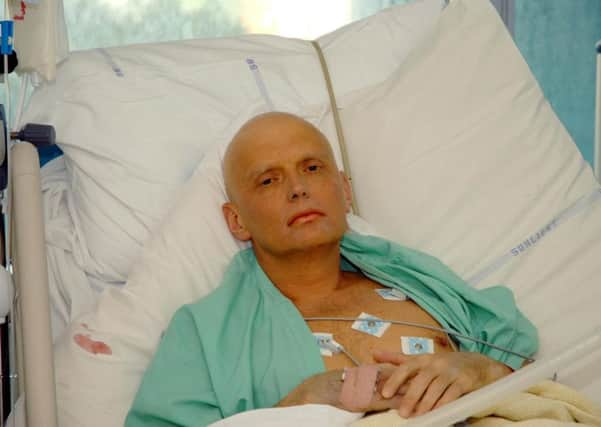Leaders: Litvinenko report | T in the Park


News that Russian leader Vladimir Putin has been linked to the murder of ex-Russian spy Alexander Litvinenko almost ten years ago has left Prime Minister David Cameron in one of the trickiest spots of his career.
The surprise is that the inquiry has gone so far as to point the finger directly at Putin – albeit with a caveat which claims he was “probably” involved.
Advertisement
Hide AdAdvertisement
Hide AdThat it mentions his name at all suggests those behind the public inquiry are pretty certain that he is behind the murder.
For Cameron, this is a very difficult situation.
It is unthinkable that the Russian president could have carried out a killing in London, under the nose of the British authorities, yet it seems that this is what has happened.
While the 2006 killing was carried out by two named men, Andrei Lugovoi and Dmitry Kovtun, the fact that the poison involved needs to be made in a nuclear reactor heavily points to state involvement. Furthermore, Russia is refusing to extradite Lugovoi and Kovtun, despite the fact they are wanted on international arrest warrants.
Yet in the wake of the publication of yesterday’s report, Russia has already issued a warning shot, pointing to the “general atmosphere of bilateral relations” with the UK and lamenting that they believe the the public inquiry was “politicised”.
In short, they are saying that things could escalate if the British Government reacts too strongly.
There will be pressure on the government to react to this to punish Russia for what was an unspeakable attack.
In another situation, the obvious reaction would be to cut off diplomatic ties, yet Cameron cannot do that. We are working with Russia in Syria, which complicates matters enormously. To react would mean to create a serious international relations problem, which we cannot afford to do.
To end the war in Syria, we need cooperation. We have already seen what can happen when Russia decides to take matters into its own hands and go in gung ho with its bombers to tackle the Syrian crisis in its own way, and that cannot continue.
Advertisement
Hide AdAdvertisement
Hide AdThis is the greatest test ever for Cameron’s diplomatic skills. We may come out of this feeling that we have been thrown over.
Yet seeking some kind of diplomatic justice would undoubtedly cause a deterioration in an already difficult situation.
Cameron has already said that he will continue relations with Russia and continue to work together, but that it would be with “clear eyes and a very cold heart”.
He needs to be careful. Home Secretary Theresa May has already issued a carefully worded statement, condemning the killing as a “blatant and unacceptable” breach of international law.
But years and years of Cold War – which may seem like a distant memory now – have shown us that cutting off diplomatic ties is not worth it and is not a solution.
Cameron needs to engage in very delicate diplomacy indeed.
T in the Park must do better
The report into the chaos which surrounded Scotland’s biggest music festival last summer has not covered the organisers in glory. The investigation into the transport furore which saw revellers wandering around country roads in the dark in an attempt to leave the venue – as well as lengthy queues to enter areas including the main stage – is nothing short of a disgrace for T in the Park, which has for more than 20 years been heralded as a flagship event for Scotland.
Damningly, Perth and Kinross Council says it has “lost confidence” in DF Concerts, the company behind the event, but it cannot be absolved entirely of blame. Council officials signed off the plans for the festival’s first event at T in the Park. And while they could not have predicted the shambles which ensued, they bear some responsibility for what happened. It is not even as if the organisers had to deal with a different council over the organisation of last year’s event: both sites were under the jurisdiction of Perth and Kinross Council, so they were on familiar territory.
However, while the council has previously taken a “can-do” approach with T in the Park, this has now changed dramatically, with the authorities threatening to pull the plug on next year’s event. Of course, this has an element of brinksmanship, as the council is surely loath to lose such a major and high-profile event.
Advertisement
Hide AdAdvertisement
Hide AdT in the Park has already attracted controversy as the Scottish Government has yet to explain why it ploughed so much funding into a private enterprise.
What the event’s organisers should take from this is: can do better; should do better; will do better.